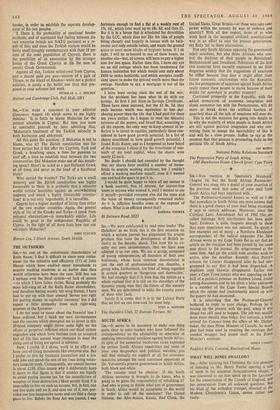SiasYou mention in 'Spectator's Notebook (August 14) that the South
African Postmaster- General was stung into a denial of your assertion of the previous week that some of your mail from South Africa had been interfered with. .
The Postmaster-General knows as well as I ,do that nowadays in South Africa one must assume that there is a good chance of your mail being examitses1 if sent to certain addresses. Moreover, since the Criminal Laws Amendment Act of 1962 (the so- called Sabotage Act) interference has been quite legal. Evidence is quite frequent enough to show that your experience was not unusual. To quote,a few examples out of many : a Northern Rhodesian correspondent of the radical magazine The New African wrote to my Cape Town flat to say that article on the elections had been posted by the same post direct to the journal. He telegrammed at the same time. And yet the article took another week to arrive, after the deadline. Recently Alan Paton's column for Contact disappeared after he had tele- grammed to say that it had been dispatched. A duplicate copy likewise disappeared. Earlier this year, a Cape Town lawyer who was appealing on be- half of a political prisoner on Robben Island, found among documents sent by his client a letter addressed to a member of the Cape Town Special Branch which the opener had inadvertently mixed up with the papers he had examined.
It is interesting that the Postmaster-General bothered to reply to your charge. Perhaps he is mixing up the present with the past, when it was illegal but still used to happen. The job was usually done more messily than today. For instance, a letter arrived for Contact from the office of Mr. Diefen- baker, the then Prime Minister of Canada. So much glue had been used in resealing the envelope that another wrapper had joined itself to the Prime Minister's envelope.
JAMES CuRREY
Paddock Wells, Cottered, Buntinglord. Hants


































 Previous page
Previous page